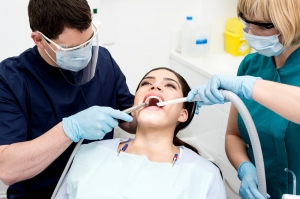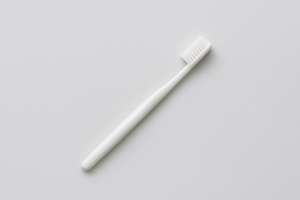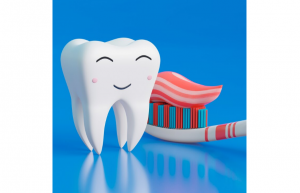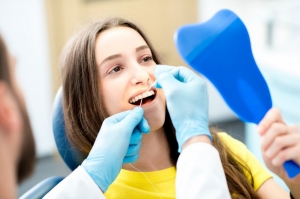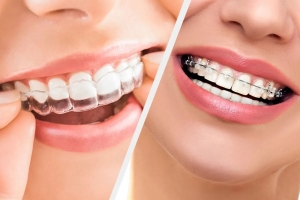We all know that brushing and flossing are essential for keeping our smiles healthy. However, even the most dedicated can sometimes overlook the basics without realizing it. When problems compound, we end up googling for a “dental hygienist near me” with bigger issues.
According to the World Health Organization, oral health is about the condition of your mouth, teeth, and the structures in your face. These are the ones that allow you to do vital things like eat, breathe, and talk. It also includes mental and social well-being, such as feeling confident, being healthy, and interacting with others without pain, discomfort, or embarrassment.
Dental hygiene isn't just about sticking to a routine; it's about doing things correctly. Little mistakes can quietly lead to underlying problems like cavities, gum disease, or bad breath over time. Sometimes, the things we skip, like flossing or cleaning our tongues, make a difference.
Most dental hygiene mistakes are simple to correct once you know what to watch for. Let's dive into five common dental hygiene mistakes that people often make unknowingly.
Mistake #1: Brushing Your Teeth Too Hard
Brushing your teeth with too much force might seem like a great way to ensure they are clean, but it can cause more harm than good. According to the Mayo Clinic, toothbrushing is a mechanical plaque control tool. Plaque, the sticky white film, is full of bacteria. Over time, it can harm your teeth and overall health.
The hardness of toothbrush bristles and the force we use while brushing can harm our teeth. When you press too hard or use a brush with stiff bristles, you risk wearing down your tooth enamel. It pushes your gums back, which leads to gum recession.
The clear signs of brushing too hard are fraying of the toothbrush bristles, or your gums feeling sore after brushing. Try switching to a soft-bristled brush and use gentle, circular motions instead of scrubbing aggressively.
Mistake #2: Skipping Flossing
Many people think brushing is enough, but skipping flossing is one of the most common blunders that often go unnoticed. Your toothbrush cannot reach the tight spots no matter how much you try. Food particles and plaque like to hide in these areas.
When you skip flossing, plaque can accumulate here. It increases your risk for cavities, gum disease, and bad breath. Plaque can turn into tartar in the long run, and only a dentist can remove it.
Flossing can help you overcome these issues, keeping your gums healthy and your smile bright. Whether you use traditional floss, picks, or a water flosser, you must make flossing a daily habit. This is a small step that offers substantial benefits.
Mistake #3: Missing Out on Routine Dentist Visits
Neglecting regular trips to the dentist is a common dental hygiene slip that often goes unnoticed until it is too late. The Hygienist Bar notes that routine dental checkups can make you feel confident, look fantastic, and maintain your long-term health through innovative preventive care.
Even if you are particular about brushing and flossing, there are spots in your mouth that only professional cleaning can tackle. Leaving them unaddressed can have dire consequences.
Firm plaque and tartar can lead to tooth decay and gum disease. Eventually, they turn into painful, complicated, or costly problems. Periodic inspection enables dentists to offer tailored advice and identify habits that might damage your teeth.
Mistake #4: Using the Wrong Toothpaste and Toothbrush
Choosing the wrong toothpaste or toothbrush might seem like a small mistake, but it can take a toll on your dental health. According to WebMD, a toothbrush with a one-inch tall and half-inch wide head is ideal for adults. Larger toothbrush heads are difficult to maneuver as they may not reach the sides and backs of your molars.
People think using a hard-bristled brush will give a better clean. These can harm your enamel and irritate your gums, resulting in sensitivity and even gum recession down the line.
It is crucial to select a toothpaste that fits your needs rather than just grabbing whatever's on the shelf. You must swap out your toothbrush every three months, or even sooner if the bristles appear worn.
Mistake #5: Incorrect Time and Technique for Brushing
Many people end up not brushing long enough or using the wrong technique. Most of us brush for less than a minute. You may think that is long enough, but it leaves your teeth and gums dirty.
Herald Scholarly Open Access notes that tooth brushing is essential for preventing significant oral health problems, like cavities and gum disease. Many dental scholars have introduced different brushing techniques. It is important to follow guidelines to choose the right method based on age and oral health condition.
If you rush, you might skip spots near the gumline and at the back of your mouth. To effectively eliminate plaque and bacteria, dentists suggest brushing for at least two minutes, twice a day. The technique is crucial too; use gentle, circular motions and ensure you clean all surfaces of each tooth, not just the front.
FAQs
What are the common problems in oral hygiene?
Common oral hygiene issues include tooth decay (cavities), gum disease (like gingivitis and periodontitis), bad breath, sensitive teeth, and oral cancers. Other typical problems include mouth ulcers, dental erosion, dry mouth, dental trauma, and tooth staining. These issues can be avoided with proper daily oral care and regular visits to the dentist.
How to prevent tooth decay?
To keep your teeth healthy and avoid decay, brush twice with fluoride toothpaste and floss daily to prevent plaque between your teeth. Reduce the intake of sugary and acidic foods and drinks. Staying hydrated goes a long way. Regular visits to your dentist for check-ups and cleanings are key to maintaining good oral health.
What are the signs of bad hygiene for your mouth?
Poor oral hygiene includes bleeding or sore gums, chronic bad breath, toothaches, and sensitivity in your teeth. Loose teeth, gum recession, and mouth sores that won't heal are also part of it. You might also notice a dry mouth, stained teeth, or pain while chewing. These symptoms reveal plaque accumulation, gum disease, or other dental concerns.
It is easy to miss those little dental hygiene slip-ups, but they can sneak up on you. These mistakes are pretty simple to fix with just a bit of awareness and a few tweaks to your routine. You can keep your smile bright and your mouth healthy for years by focusing on key points.

